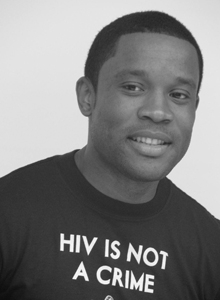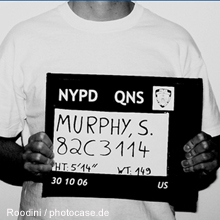Robert Suttle was sentenced to two years' probation in 2009 for not explicitly informing a sexual partner of his HIV infection. In the US state of Louisiana, where Robert lived at the time, this is considered a sexual offence. Nicholas Feustel spoke to him.

How did the whole thing start?
It started on New Year's Eve 2008. I met some friends and we were hanging out. And there was a young man, pretty much my age. We might have had a drink or two, but I don't remember being drunk or anything that night.
This guy and I then decided to go to his house. I spent the night at his place and at first we decided not to have sex because we didn't have any condoms - I had asked him if he had any. So we just lay in bed together. Then, of course, temptation came and we ended up having unprotected sex.
How did you make it clear to him that you were HIV-positive?
I remember him saying we could have penetrative sex, but I shouldn't cum inside him because we didn't have condoms. That's my understanding of our agreement. He seemed to be okay with it. We continued in this way for a while. So there was no problem for him.
Did you know his HIV status?
No. I don't think I even asked him. I was so focussed on myself, on my condition, on what I had to do to not harm him. I was more concerned about protecting him, just like most people with HIV are probably more concerned about protecting their partners.
What happened next?
Our casual relationship lasted about three months. As we got to know each other better, we were constantly arguing. We obviously never saw eye to eye and when it came to the break-up, he was very upset.
As far as I remember, I reminded this guy of my HIV status. Next, he threatened to report me to the police for hiding my infection, bearing in mind that he was very upset about our break-up.
When and how did you find out that he had actually reported you?
He kept threatening me by text message that I had to give in and that I should be ashamed of myself. And that he would take the test and that if it turned out positive, he would go to the police.
Suddenly I got messages on my machine from the local police and from a criminal police officer for sexual offences. I didn't answer them because I just didn't know what to do in this situation. So I simply ignored the calls.
When I came home from work one day, I found a search warrant on the table. Then I realised that someone had been in my flat and had searched my things for any evidence of HIV to find out whether I was really HIV-positive or not. And they had taken things like my phone book, for example, probably to find other potential 'victims'.
And what happened next?
After some time, I was visited at work by detectives for sexual offences. I was very busy at the time and therefore couldn't talk to them in peace. I remember that they gave me a business card, but I never went to see them because I didn't understand what was going on and I didn't want to just hand myself over to them.
A few months later, they came back to my company. One of the security guards told me that I had a visitor. Next they told me to put my hands behind my back because I was under arrest.

I was simply shocked. I was completely dazed, thinking about my life and how it would change. And, of course, that my family and the public would find out, as I had already been exposed in front of my colleagues. I remember them handcuffing me, putting me in the car and taking me to the city prison where I was registered.
After Robert was released on bail, hired a lawyer and later - in the hope of being released with alder penalty - had pleaded guilty without a trial, he was given a suspended sentence of two years. The The reason given was that he had "deliberately exposed another person to the AIDS virus". Robert does not know whether his partner at the time was HIV-positive. has not spoken to him since the charges were filed and is no longer allowed to contact him by court order.
In addition to the suspended sentence, you also had to register as a sex offender. What consequences did that have for you?
Being registered as a sex offender means that all your affairs are out in the open. My photo appeared in the local paper, notification cards were sent out in the community within a few miles. And that means to your family, friends, people you go to church with - anyone who lives near you.
This also means that a probation officer can turn up at your home or workplace once a month or at any time. And that you have to report to them every month. If you want to leave the state or area where you live, you must apply for a travel permit. In Louisiana, it also means that your driving licence says "sex offender" in big red letters under your photo. And I've been registered for 15 years.
How did you deal with this registration?
After I was convicted and got my suspended sentence, after I registered with the probation office and found out about registering as a sex offender, my lawyer and I took this matter to court. It ruled months later something like this: "Yes, you do have to register, even though we didn't tell you that, and you also have to go to prison for a while!" Because the conviction as a sex offender made a prison sentence mandatory, I was sentenced to six months in prison.
Despite his suspended sentence, Robert was sent to prison for six months. After his release, he was without a job and began volunteering at an AIDS service organisation, where he expanded his knowledge of HIV. Robert now works full-time as an assistant to the management of the SERO project. SERO is a network of people living with HIV and allies who are committed to fighting stigma and discrimination. SERO gives a face and a voice to all those who are persecuted or at risk of persecution.
What advice would you give to people who are being prosecuted for not disclosing their HIV infection or for potential or actual HIV transmission?
I would advise them not to talk too much about it, don't give out personal information unless you have a lawyer to guide and support you. I would advise them to go online, type in "HIV and criminalisation" and study the available source material.
And I would encourage them to introduce their attorneys to those sources, because they need to know those facts as well and understand what they're fighting against. Because you certainly don't want to face the criminal justice system without understanding why and how they can do all the things they're doing against you if they're prosecuting you. And - you have to hope and just fight.









